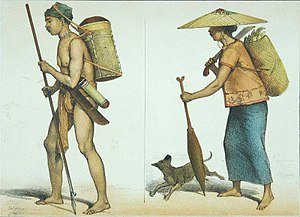|
Meratus Dayak
The Meratus or Meratus Dayak is an ethnic group that inhabits the Meratus Mountains of South Kalimantan, Indonesia. The Banjar Kuala people would refer the Meratus people as Urang Baiju or Dayak Baiju, as they consider them to be the same as the Ngaju people. While the Banjar Hulu Sungai people would call the Meratus people as Urang Bukit, Dayak Bukit or Dayak Buguet.[1][2] NamingA Meratus Dayak's name changes over the course of his or her life. Children have "body names" (ngaran badan) that are not usually used after adolescence. When they have children, men and women acquire teknonyms (ngaran ba'anak). For a man this name is Ma X or Pa'an X, where X is the name of one of his children, or sometimes another word. For a woman it is Induan X or Dun X, depending on which part of the Meratus area she lives in. Older men become Awat X (grandfather of X) and older women become Apih X.[3] LanguageLocal Meratus Dayak dialects are closely related linguistically to both Indonesian (the national language), and to the Banjar language. Most Meratus Dayak can speak Banjar and Indonesian since government administrators conduct business in Indonesian and trade with the Banjar people is conducted in Banjar. Sub-ethnicsThe Meratus people are divided into several sub-ethnics including:-
CultureDance
Rituals
EconomyMeratus Dayak are primarily farmers, and rice is the main crop. Rice cultivation occurs in swiddens (cleared portions of the forest). Swiddens are usually cultivated for a few years, then the forest is allowed to regenerate when the farmers move to a different swidden location to farm. The farmers may return to a swidden, although there is usually at least 15 years between leaving and returning to a swidden.[6] Meratus people also collect forest products and trade with Banjar at markets outside the mountains. In these transactions Banjar typically act as middle men between the Meratus and other traders. Social organizationMost Meratus live and farm in umbun which are also considered the primary social units among the Meratus Dayak. Umbun are founded by a man and a woman, usually a married couple, but sometimes also a brother and sister, a widow and her adult son, or other male-female pairs. Umbun also embrace a variety of dependents who have not yet founded their own umbun, including children and recently married, disabled, and widowed adults. The founding pair is responsible for the umbun.[3][7] Some Meratus have also been moved into villages by government resettlement programs. The Meratus are classified as a "semi-nomadic" isolated tribe,[8] and are the target of government development programs as such. References
Further reading
|
||||||||||||||||||||||||
